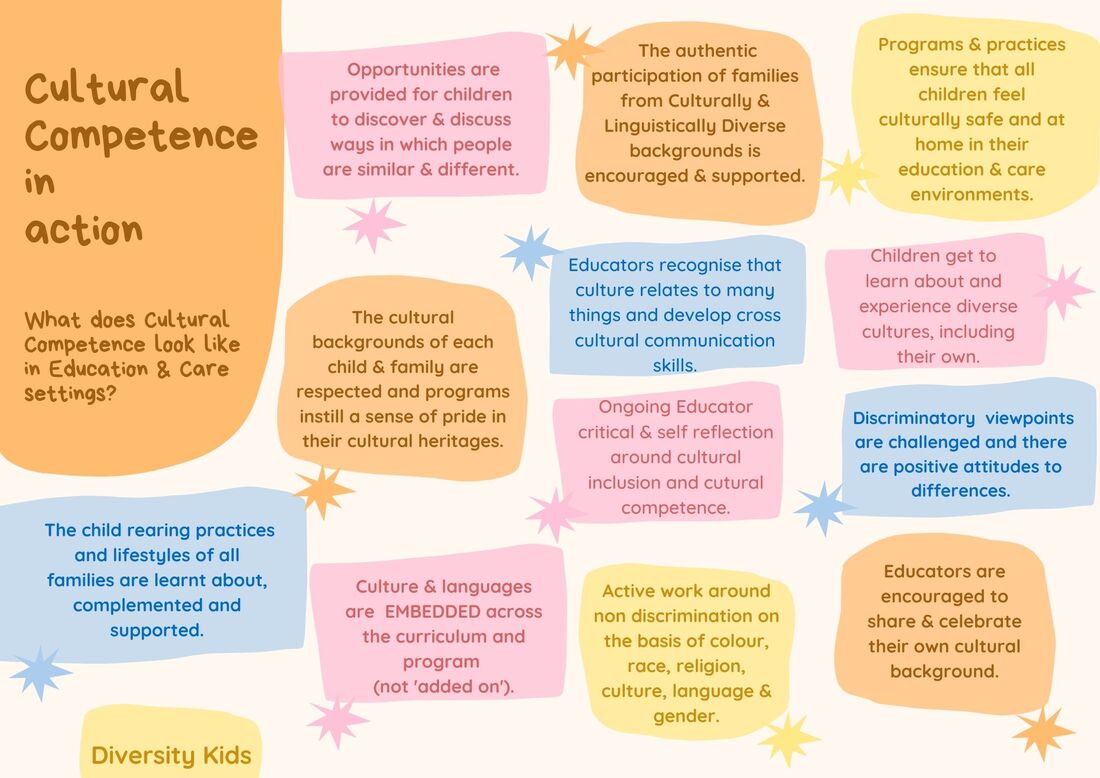|
Cultural Perspectives in Education & Care
What is Cultural Competence?
The Early Years Learning Framework describes Cultural Competence as “much more than an awareness of cultural differences. It is the ability to understand, communicate with and effectively interact with people across cultures”. The team at Diversity Kids believe that Cultural Competence is also about recognising that all children are born belonging to a culture. These children often come to our education and care settings with strong cultural identities that may involve traditional practices, values that they are raised with, celebrations and knowledge. Cultural Competence embodies Educators taking the time and making an effort to understand the unique sense of culture & belonging that each child experiences within their cultural community and as Educators, working towards creating a care environment that offers a similar sense of belonging (like an extension of the child’s home environment). Cultural Competence has both a visible, tangible layer (including things like purchasing multicultural & Aboriginal resources and embedding these in every day practices, celebrating cultural festivals, inviting Aboriginal people to come and tell stories, translating information for families and so on). There is also another layer to Cultural Competence that has more to do with our attitudes, knowledge, the relationships we make, the connections we build with our children & families, the way we extend on our knowledge base and our attitudes towards diversity. It includes the way we effectively communicate and interact with children, families & people across cultures. One of the keys to cultivating Cultural Competence is our ability to view Cultural Competence as an ongoing, integral part of a continuous learning process, a life long journey, rather than a destination. Cultural Competence and the experience of it varies from person to person and from situation to situation. It requires a growth mindset, a quest for knowledge around cultures & diversity, ongoing reflection that leads to identifying, learning from and implementing new opportunities and putting cross cultural practices into action. In essence, Cultural Competence is an opportunity for limitless learning, an exchange of information, connection and collaboration. Developing and cultivating your Cultural Competence invites you to begin by looking into your own cultural background – the experiences, values and knowledge of your own culture, family and community history - and recognising that people from other cultures may not share them. Cultural Competence is also looking at everything through a cultural lens and building that into your everyday practices, policies, programs and philosophies. What are some tips, tools & skills to help Educators become culturally competent? Diversity Kids has developed a Checklist that describes some of the characteristic attitudes, skills & knowedge required to be a Culturally Competent Educator. Below is an excerpt from that Checklist: Culturally Competent Educators: Self Reflection:
Attitudes:
Knowledge:
Practices:
What does Cultural Competence mean? How do we do it? How do we become it? Cultural Competence means different things to different people. Everyone’s Cultural Competence journey is unique. We are all at different stages of our journey but the most important thing is that we start this journey and take the small steps, even if at times we feel that our approach wavers on the tokenistic. Over time, with ongoing reflection, opportunities, practice, perseverance and a commitment to continue the journey, one is able to cultivate their competence around culture. This eventually leads to an enriched journey of cultural confidence with tools & knowledge to better communicate, include and interact cross culturally with children, families and Educators that we work with and in our everyday personal interactions. References: https://wehearyou.acecqa.gov.au/2014/07/10/what-does-it-mean-to-be-culturally-competent/
0 Comments
Leave a Reply. |
AuthorMeni Tsambouniaris Archives
March 2024
Categories |
|
|
©Diversity Kids 2023. Designed by BlackRhino Creative.
|


 RSS Feed
RSS Feed